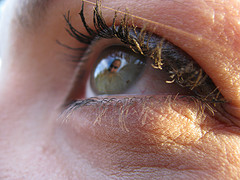
 You may have heard the scary news about mercury in mascara. Because mercury exposure at any level is dangerous, we wanted to warn you to check ingredient labels-on mascaras, and other products.
You may have heard the scary news about mercury in mascara. Because mercury exposure at any level is dangerous, we wanted to warn you to check ingredient labels-on mascaras, and other products.
Mercury has several adverse health effects, including birth or developmental defects, damage to the brain and nervous system, and organ system toxicity. Fortunately, most mascaras don’t contain mercury anymore, but some still do, especially the “cake-type” varieties. How can you tell? Don’t look for “mercury” on the ingredient list. In mascaras and other personal-care products, mercury comes from an ingredient called “thimerosal,” a compound that’s about 49% mercury by weight, and is used as an antiseptic and antifungal agent. (Look for “thimerosal” or “mercuric” on the label.)
Thimerosal is also used in vaccines and tattoo ink, basically to kill bacteria and fungi. It’s been linked to allergies and skin irritation, and because it’s easily absorbed through the skin, the FDA banned the use of it in all cosmetics 30 years ago…except in those products you use around the eyes. May seem illogical at first, but the eyes are more susceptible to infection, so products used anywhere around them need to be free of contaminants. Thimerosal has long been the favorite anti-microbial, but with new alternatives now available, regulation is currently outdated.
Though levels of thimerosol in personal-care products are low, concern increases when you find it in some eye moisturizers; makeup removers; nose, eye, and ear drops; eye ointments; and some imported skin lighteners and soaps. Combine that with our potential exposure to mercury in the fish we eat and you’ve got too much exposure to this dangerous metal. According to Carl Herbrandson, a toxicologist with the state Health Department, mercury accumulates in the body, so consumers should avoid exposure whenever possible. “Mercury is bad, basically in all forms that get into the body,” Herbrandson said.
The state of Minnesota took action in 2007 by becoming the first (and so far, the only) state to ban intentionally added mercury in cosmetics in 2007. “Mercury does cause neurological damage to people even in tiny quantities,” said Sen. John Marty, the Democrat who sponsored the ban. “Every source of mercury adds to it. We wanted to make sure it wasn’t here.”
Until regulation catches up with modern-day knowledge and preference, choose mascaras made by more health-conscious companies like Afterglow Cosmetics, Ecco Bella, Honeybee Gardens, and Jane Iredale, or research your favorite brand at The Skin Deep Database to make sure it’s free of mercury and other harmful carcinogens.
Have a favorite mercury-free mascara? Please tell us about it!
Photo courtesy of scruge11, via Flickr.com.

